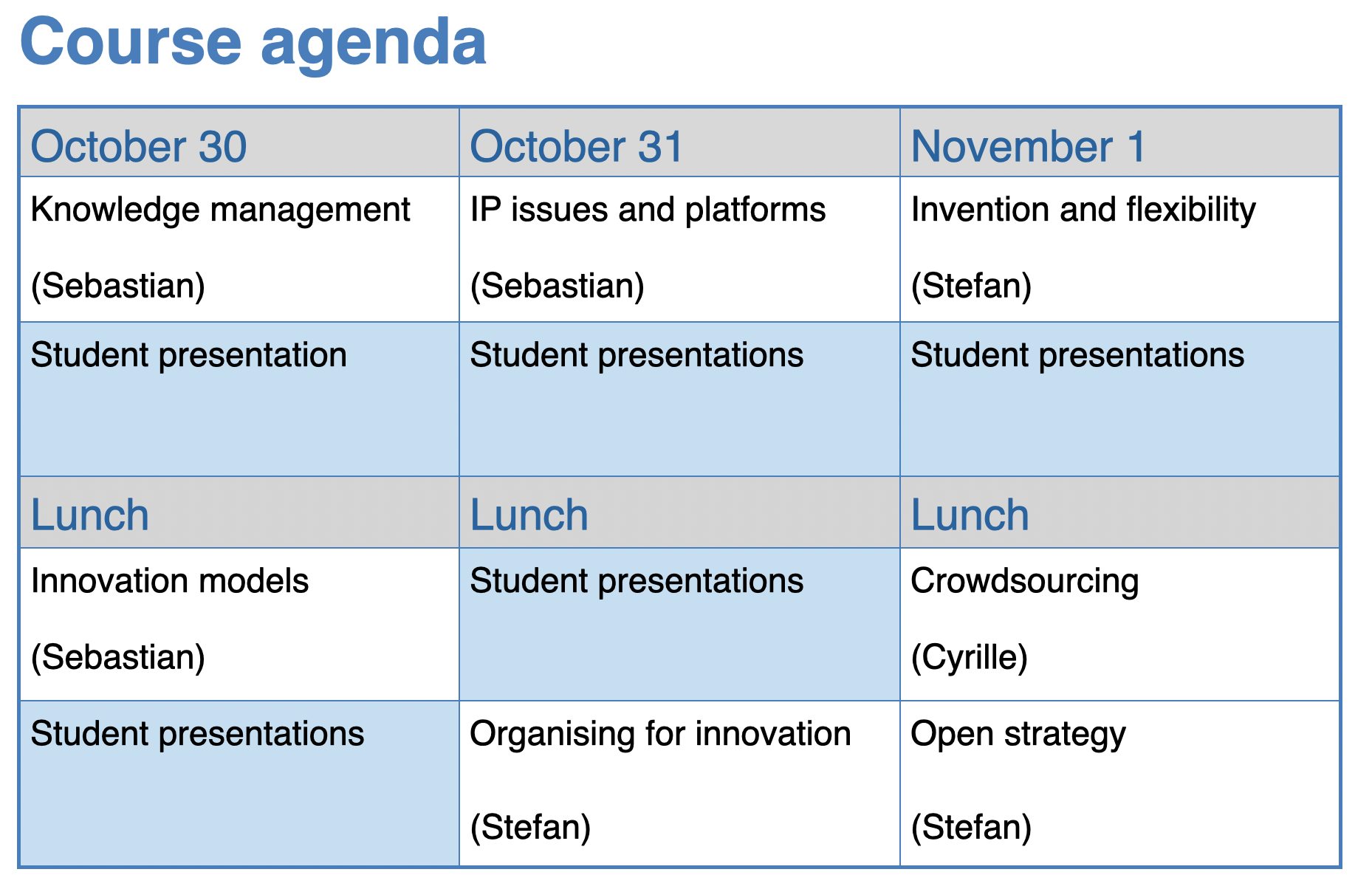Open and User Innovation
Lecturers: external page Prof Dr. Stefan Haefliger and external page Prof. Dr. Sebastian Spaeth
Teaching Assistant: Cyrille Grumbach
Zoom link: external page https://ethz.zoom.us/j/2049413948
Group projects organization (4-5 per group): external page https://docs.google.com/spreadsheets/d/1BgvmCz12-duULe756OysXx7f_ZNROuERncLGiAP2PCo/edit#gid=0
Lecture Presentation (download them from this Google Drive, free of access): external page https://drive.google.com/drive/folders/1Xv1eiZp_ccrD95sGai-LDGSvI_UGwUtN?usp=drive_link
.

Overview
The block course on open and user innovation is offered as an elective course at MTEC and extends courses on knowledge management and innovation as well as marketing. The students are introduced to the concept of open innovation as well as the long-standing tradition of actively involving users of technology and other knowledge-intensive products in the development and production process. Through own cases they develop an entrepreneurial understanding of product development under distributed, user-centered, or open innovation strategies. Theoretical underpinnings taught in the course include models of innovation and the structuration of technology.
The course includes both lectures and exercises alternately. The goal is to understand the opportunity of user innovation for management and develop strategies to harness the value of user-developed ideas and contributions for firms and other organizations.
The students actively participate in discussions during the lectures and contribute presentations of case studies during the exercises. The combination should allow to compare theory with practical cases from various industries.
The course presents and builds upon recent research and challenges the students to devise innovation strategies that take into account the availability of user expertise, free and public knowledge, and the interaction with communities that span beyond one organization.
Performance assessment will be: a written group essay based on the open/user innovation case that participants will research and present during the block seminar (including the slides). Each group will have to hand in a 15-20 page essay, details on the required format and the content will be distributed during the course. Active lass participation is required.
Administrative Issues
- Introduction: 26. Sep 2023, 15:00-17:00 (Online)
- Module I: 30. Oct 2023, 09:15-17:00 (HG F 26.3)
- Module II: 31. Oct 2023, 09:15-17:00 (HG F 26.3)
- Module III: 01. Nov 2023, 09:15-17:00 (HG F 26.3)
Group Essay Submission Date: announced during the course
Slides will be uploaded to the course moodle.
How to get the 3 credit points (the same for all students)
- Class presentation of a user innovation case (50% of the grade)
- Group Essay (50% of the grade)
Selected student presentations from (2010-2013)
Kasouha, Seregni and Agrawal : The invisible helmet
Romila and Kottmann : Phonebloks
Grob and Schmid: protected page Gimbal systems
Ebneter and Studer: protected page Zoybar
Tata, Eigenmann and Davidson: protected page 3D printing
Müller, Schmitt and Hobi: protected page Kitesurfing
Solomon: protected page Boosted boards
Soltamova, Papatheologos and Pincet: protected page Local motors
Keidel, Eichenhofer and Müller: protected page Multicopters
Paurat and Gunde Panga: protected page Facebook
Gonzalez: protected page P&G Connect + Develop
Kasics, Schnellmann and Flury: protected page Coffee roaster
Ehrle and Engler: protected page The ''Jugaad'' way: The Mitti Cool Refrigerator
Stark: protected page Arduino (protected page handout)
Lüthi, Marfurt and Sprock: protected page Multitouch screens
Andronikakis and Öznur: protected page Android
Baschnagel and Haller: protected page 2.4 GHz Transceiver Systems
Reading assignments (sorted by priority):
To access the journal articles listed below, you have to be within the ETH domain.
- external page von Hippel, Eric. 2005. Democratizing Innovation. MIT Press.
- external page von Hippel, E., & von Krogh, G. 2003. The private-collective innovation model in Open Source software development: Issues for organization science.Organization Science, 14: 209-223.
- external page Faulkner, P. and Runde J. 2009. On the identity of technological objects and user innovations in function.Academy of Management Review, 34(3): 442-462.
- external page von Krogh, G. 1998. Care in Knowledge Creation.California Management Review, 40: 133-154.
- external page Jeppesen, L.B. and Frederiksen, L. 2006. Why do User Contribute to Firm-hosted User Communities? The Case of Computer Controlled Music Instruments.Organization Science, 17: 45-63.external page
- external page Sarasvathy, S. D. 2001. Causation and effectuation: Toward a theoretical shift from economic inevitability to entrepreneurial contingency.Academy of Management Review, 26: 243-263.
- external page von Krogh, G. K. Ichijo, I. Nonaka. 2000. Enabling Knowledge Creation: How to Unlock the Mystery of Tacit Knowledge and Release the Power of InnovationOxford University Press.
- protected page Baldwin, C., Hienerth, C., & von Hippel, E. 2006. How user innovations become commercial products: A theoretical investigation and case study. Research Policy. 35 (9): 1291-1313.
- external page Kozinets, R.V. 2002. The field behind the screen: Using netnography for marketing research in online communities. Journal of Marketing Research, 39: 61-72